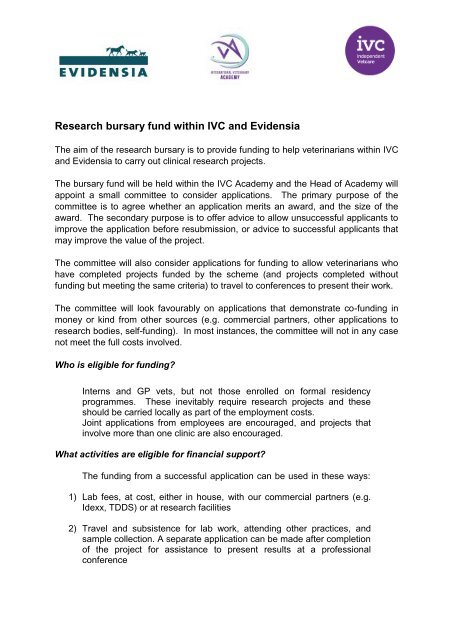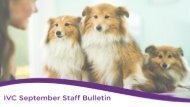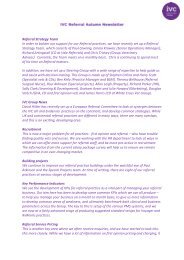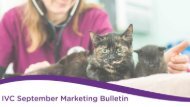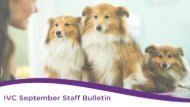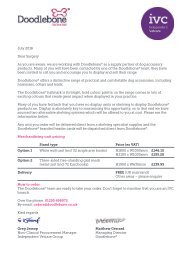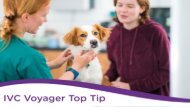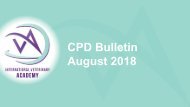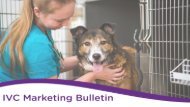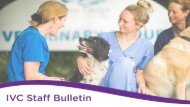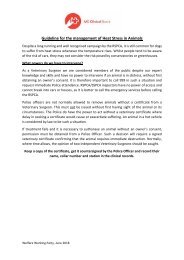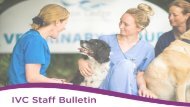IVC research bursary
You also want an ePaper? Increase the reach of your titles
YUMPU automatically turns print PDFs into web optimized ePapers that Google loves.
Research <strong>bursary</strong> fund within <strong>IVC</strong> and Evidensia<br />
The aim of the <strong>research</strong> <strong>bursary</strong> is to provide funding to help veterinarians within <strong>IVC</strong><br />
and Evidensia to carry out clinical <strong>research</strong> projects.<br />
The <strong>bursary</strong> fund will be held within the <strong>IVC</strong> Academy and the Head of Academy will<br />
appoint a small committee to consider applications. The primary purpose of the<br />
committee is to agree whether an application merits an award, and the size of the<br />
award. The secondary purpose is to offer advice to allow unsuccessful applicants to<br />
improve the application before resubmission, or advice to successful applicants that<br />
may improve the value of the project.<br />
The committee will also consider applications for funding to allow veterinarians who<br />
have completed projects funded by the scheme (and projects completed without<br />
funding but meeting the same criteria) to travel to conferences to present their work.<br />
The committee will look favourably on applications that demonstrate co-funding in<br />
money or kind from other sources (e.g. commercial partners, other applications to<br />
<strong>research</strong> bodies, self-funding). In most instances, the committee will not in any case<br />
not meet the full costs involved.<br />
Who is eligible for funding?<br />
Interns and GP vets, but not those enrolled on formal residency<br />
programmes. These inevitably require <strong>research</strong> projects and these<br />
should be carried locally as part of the employment costs.<br />
Joint applications from employees are encouraged, and projects that<br />
involve more than one clinic are also encouraged.<br />
What activities are eligible for financial support?<br />
The funding from a successful application can be used in these ways:<br />
1) Lab fees, at cost, either in house, with our commercial partners (e.g.<br />
Idexx, TDDS) or at <strong>research</strong> facilities<br />
2) Travel and subsistence for lab work, attending other practices, and<br />
sample collection. A separate application can be made after completion<br />
of the project for assistance to present results at a professional<br />
conference
3) Not clinical work (examinations, in house radiographs etc:). This should<br />
be borne by the local business as agreed with the Clinical Director or<br />
equivalent<br />
4) Not drug provision. This should be clinically justified and chargeable or<br />
through drug company support<br />
5) University registration fees: PhD or MSc registration is typically £2000<br />
pa for part time students. Funds to cover half cost each year for up to 4<br />
years subject to satisfactory progress (candidate to provide a progress<br />
report to the committee each year)<br />
6) Not fees for professional memberships or activity that falls within clinical<br />
CPD<br />
7) Not work involving animal experimentation (i.e. that is outside the<br />
definition of veterinary surgery, or not covered by an Animal Test<br />
Certificate). This restricts funding to observational studies but avoids<br />
<strong>IVC</strong> being seen as supporting animal experimentation. BSAVA fund<br />
<strong>research</strong> through Petsavers and apply similar criteria. The committee<br />
will need to have evidence that an ethical committee had approved the<br />
work, or had deemed that ethical approval was not required<br />
8) Fees for statistical advice can be funded<br />
9) Publication fees may be covered if the committee considers that these<br />
are merited by the value of the project to animal welfare and the career<br />
of the applicant, and no alternative route to publication is available<br />
What does the Board want from each successful applicant?<br />
1) A short description of the project describing the clinical problem, the aim<br />
of the project and the intended methods and materials. This should<br />
generally be limited to 500-600 words. This should have the support and<br />
sign off from the applicant’s Clinical Director or line manager. This<br />
should be emailed to Sally Clark, Head of Academy using<br />
sclark@independentvetcare.co.uk<br />
2) A description of how the work makes a contribution to advancing small<br />
animal, farm animal or equine veterinary care and/or animal welfare (i.e.<br />
has real world clinical impact now or in the foreseeable future)<br />
3) A time plan for execution, lab work and manuscript preparation.<br />
4) A list of persons involved in the study
5) Evidence that this would advance the career of the fund holder, such as<br />
through progressing towards a post grad qualification, or achieving<br />
publication in national or international veterinary journals<br />
6) Promotes the local business and/or <strong>IVC</strong> or Evidensia, for example by<br />
producing work that can be published as above, or is likely to be<br />
accepted as an abstract or poster at a national or international clinical<br />
veterinary meeting (e.g BSAVA, BVOA, BVZS, ECVS, ECVIM, BEVA,<br />
ACVS, AAEP etc). The applicant should include a publication plan which<br />
highlights which scientific journals and/or congresses are intended for<br />
publication. However, there should also be a plan for how to publish in<br />
layman magazines and similar.<br />
Other information<br />
1) In considering an application, the committee will take into account the<br />
likelihood that the results will be acceptable for publication<br />
2) For projects requiring funding over more than one year, the applicant will<br />
be required to produce a progress report each year, mapping the work<br />
completed against the initial plan and justifying costs incurred to date.<br />
The committee may adjust funding in subsequent years according to the<br />
progress achieved or otherwise<br />
3) On completion, the committee expects to receive a report of publishable<br />
standard, and to use extracts or a summary from this for internal and<br />
external promotion, subject to any restrictions that this has on later<br />
publication in a professional journal<br />
Presentation of results<br />
The committee will also consider applications for funding to allow presentation<br />
of the work at national and international conferences. Applications for this<br />
funding can come from successful applicants for the <strong>research</strong> <strong>bursary</strong> once the<br />
project is completed, or from others who have completed similar projects<br />
without <strong>IVC</strong> Research Bursary support. Funding will be contributed towards the<br />
following:<br />
1) A single person from the project<br />
2) Travel and subsistence costs within <strong>IVC</strong> general or country specific<br />
guidance for expenses<br />
3) Costs of producing a poster (design, printing, delivery)
4) Some conferences charge for presenting results: these conferences will<br />
not generally be considered for funding<br />
5) The fund may not be used for registration fees for any meeting<br />
6) For international meetings, the committee will consider if the project is of<br />
sufficient merit to justify the additional cost incurred, compared to a<br />
national or European meeting<br />
December 2017


